英语易混词汇辨析
- 格式:doc
- 大小:44.00 KB
- 文档页数:5
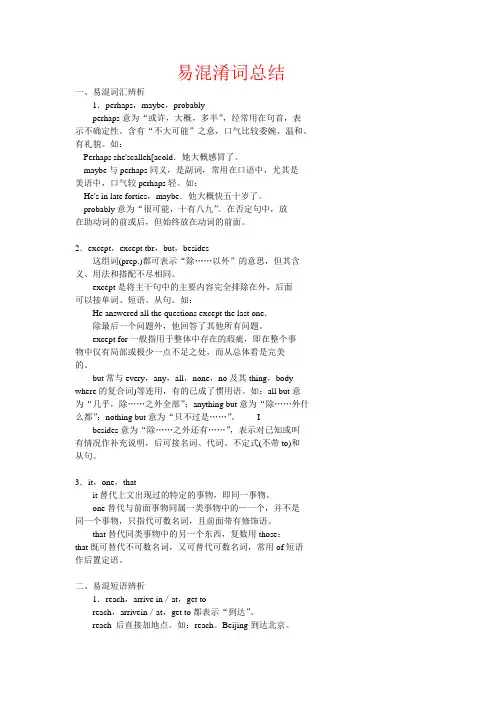
易混淆词总结一、易混词汇辨析1.perhaps,maybe,probablyperhaps意为“或许,大概,多半”,经常用在句首,表示不确定性。
含有“不大可能”之意,口气比较委婉、温和、有礼貌。
如:Perhaps she'scalleh[acold.她大概感冒了。
maybe与perhaps同义,是副词,常用在口语中,尤其是美语中,口气较perhaps轻。
如:He's in late forties,maybe.他大概快五十岁了。
probably意为“很可能,十有八九”。
在否定句中,放在助动词的前或后,但始终放在动词的前面。
2.except,except tbr,but,besides这组词(prep.)都可表示“除……以外”的意思,但其含义、用法和搭配不尽相同。
except是将主干句中的主要内容完全排除在外,后面可以接单词、短语、从句。
如:He answered all the questions except the last one.除最后一个问题外,他回答了其他所有问题。
except for一般指用于整体中存在的瑕疵,即在整个事物中仅有局部或极少一点不足之处,而从总体看是完美的。
but常与every,any,all,none,no及其thing,body where的复合词)等连用,有的已成了惯用语。
如:all but意为“几乎,除……之外全部”;anything but意为“除……外什么都”;nothing but意为“只不过是……”。
Ibesides意为“除……之外还有……”,表示对已知或叫有情况作补充说明,后可接名词、代词、不定式(不带to)和从句。
3.it,one,thatit替代上文出现过的特定的事物,即同一事物。
one替代与前面事物同属一类事物中的—一个,并不是同一个事物,只指代可数名词,且前面带有修饰语。
that替代同类事物中的另一个东西,复数用those:that既可替代不可数名词,又可替代可数名词,常用of短语作后置定语。
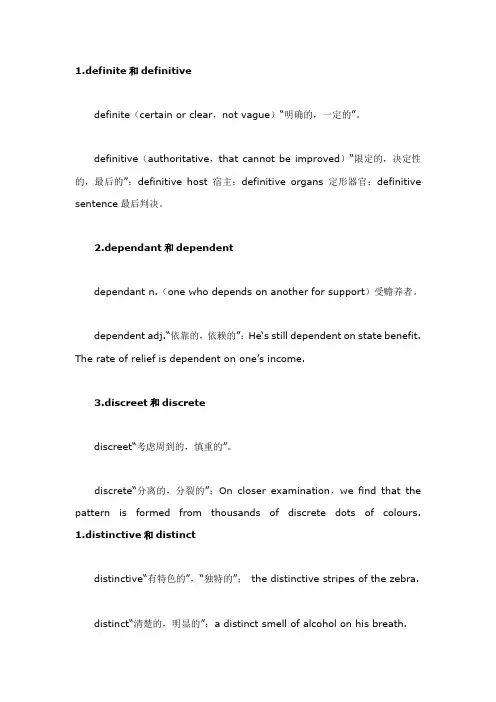
1.definite和definitivedefinite(certain or clear,not vague)“明确的,一定的”。
definitive(authoritative,that cannot be improved)“限定的,决定性的,最后的”;definitive host宿主;definitive organs定形器官;definitive sentence最后判决。
2.dependant和dependentdependant n.(one who depends on another for support)受赡养者。
dependent adj.“依靠的,依赖的”;He…s still dependent on state benefit. The rate of relief is dependent on one‟s income.3.discreet和discretediscreet“考虑周到的,慎重的”。
discrete“分离的,分裂的”;On closer examination,we find that the pattern is formed from thousands of discrete dots of colours.1.distinctive和distinctdistinctive“有特色的”,“独特的”;the distinctive stripes of the zebra.distinct“清楚的,明显的”;a distinct smell of alcohol on his breath.2.dual和dueldual“二重的”;dual personality双重人格;dual control双重管辖;duel“决斗,竞争”;fight a duel with sb.与某人决斗;challenge sb. to a duel向某人提出决斗;a duel of wits斗智3.eatable和edibleeatable a.“可食用的,可吃的”;n.[pl.]“食物、食品”。
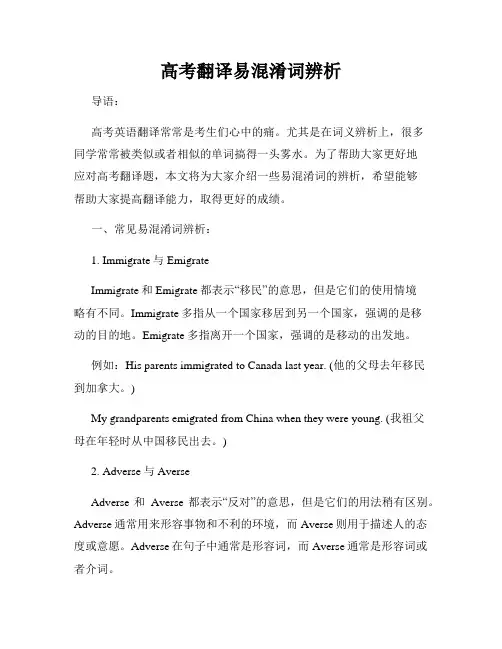
高考翻译易混淆词辨析导语:高考英语翻译常常是考生们心中的痛。
尤其是在词义辨析上,很多同学常常被类似或者相似的单词搞得一头雾水。
为了帮助大家更好地应对高考翻译题,本文将为大家介绍一些易混淆词的辨析,希望能够帮助大家提高翻译能力,取得更好的成绩。
一、常见易混淆词辨析:1. Immigrate与EmigrateImmigrate和Emigrate都表示“移民”的意思,但是它们的使用情境略有不同。
Immigrate多指从一个国家移居到另一个国家,强调的是移动的目的地。
Emigrate多指离开一个国家,强调的是移动的出发地。
例如:His parents immigrated to Canada last year. (他的父母去年移民到加拿大。
)My grandparents emigrated from China when they were young. (我祖父母在年轻时从中国移民出去。
)2. Adverse与AverseAdverse和Averse都表示“反对”的意思,但是它们的用法稍有区别。
Adverse通常用来形容事物和不利的环境,而Averse则用于描述人的态度或意愿。
Adverse在句子中通常是形容词,而Averse通常是形容词或者介词。
例如:She had an adverse reaction to the medication. (她对药物有不良反应。
)I am averse to taking risks. (我不愿意冒险。
)3. Assure、Ensure与InsureAssure、Ensure和Insure都表示“确保”的意思,但是它们的用法略有不同。
Assure常常用来表示向人提供保证或安抚情绪,ensure表示确保某事发生或做好准备,而insure则用于表示购买保险。
例如:I assure you that everything will be fine. (我向你保证一切都会好起来的。
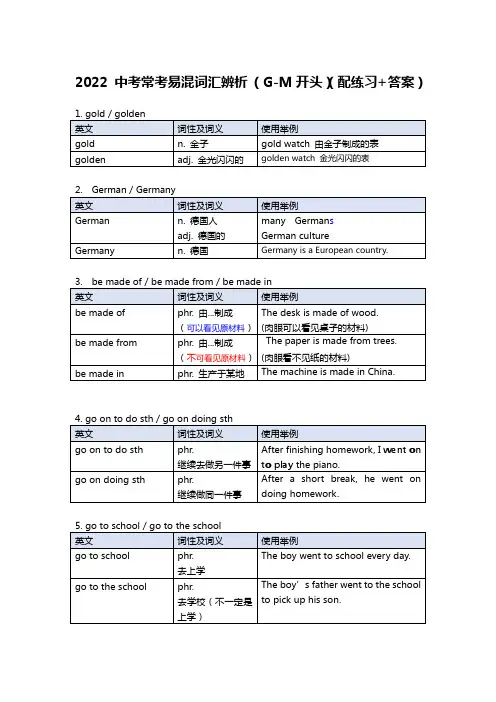
2022 中考常考易混词汇辨析(G-M开头)(配练习+答案)9. jeans/ trousers / pants/ shoes 等成双成对的词的主谓一致问题10. 【参加】的词组Practice1. The sun is shining. Don't look at the sun.A.gold; straightB.golden; straightlyC.golden; straightD.gold; straightly2. —Do you come from ?—No. But I can speak well.A.Germany; GermanB.German; GermanyC.Germany; GermanyD.German; German3. Students will make progress if they a subject.A.be made ofB.be made fromC.be made up ofD.be made in4. The kite is paper, and the paper is trees.A.made of; made fromB.made from; made ofC.made of; made inD.made from; made in5. It's getting dark, let's , shall we?A.go on to workB.go on workingC.to go on workD.to go on working6. Students to study. Their parents to pick them up.A.go to the school; go to the schoolB.go to school; go to schoolC.go to the school; go to schoolD.go to school; go to the school7. Boys and girls, time is up, please check your name and your papers.A.hand outB.hand upC.hand inD.hand down8. The hunter the fox, took off its skin and it on the tree.A.hung; hangedB.hung; hungC.hanged; hangedD.hanged; hung9. Our teacher often tells us different events that have strong influence on China.A.historic; historyB.historical; historicC.history; historyD.history; historic10. In order to have a better understanding of those places of interest, she read some books before the visit.A.historical; historicalB.historical; historicC.historic; historicalD.historic; historic11. Why don't you us to the speech contest?A.join; joinB.take part in; take part inC.take part in; joinD.join; take part in12. A is a long journey on a ship or in a spacecraft.A.tourB.voyageC.tripD.continent13. The boy's mother is . He has to look after his mother at home.A.bad; sickB.ill; badC.ill; sickD.sick; ill14. This year's Government Work Report many issues economic growth, environmental protection, etc.A.includes; includingB.include; includingC.is included; includeD.including; include15. Thousands of people lost their in the earthquake, so we should value our daily .A.lives; lifeB.life; lifeC.lives; livesD.life; lives16. Independence does not mean (shut)the door to the world.本章答案1-5 BACAB 6-10 DCDDC 11-15 DBCAA 16. shutting。
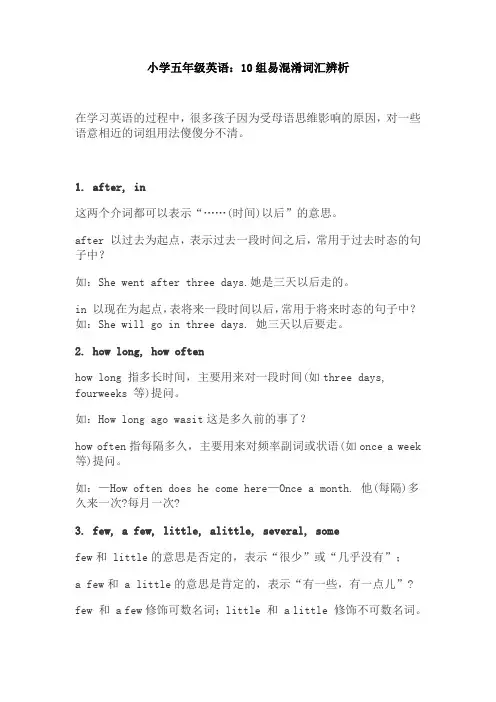
小学五年级英语:10组易混淆词汇辨析在学习英语的过程中,很多孩子因为受母语思维影响的原因,对一些语意相近的词组用法傻傻分不清。
1. after, in这两个介词都可以表示“……(时间)以后”的意思。
after 以过去为起点,表示过去一段时间之后,常用于过去时态的句子中?如:She went after three days.她是三天以后走的。
in 以现在为起点,表将来一段时间以后,常用于将来时态的句子中?如:She will go in three days. 她三天以后要走。
2. how long, how oftenhow long 指多长时间,主要用来对一段时间(如three days, fourweeks 等)提问。
如:How long ago wasit这是多久前的事了?how often指每隔多久,主要用来对频率副词或状语(如once a week 等)提问。
如:—How often does he come here—Once a month. 他(每隔)多久来一次?每月一次?3. few, a few, little, alittle, several, somefew和 little的意思是否定的,表示“很少”或“几乎没有”;a few和 a little的意思是肯定的,表示“有一些,有一点儿”? few 和 a few修饰可数名词;little 和 a little 修饰不可数名词。
several 用于修饰可数名词,语意比 a few 和some 更肯定,含有“好几个”的意思。
some可修饰可数名词,也可修饰不可数名词,从数量上说,它有时相当于a few或 alittle,有时指更多一些的数量?4. the other, anotherthe other指两个人或事物中的“另一个”,表示特指。
如:We stood on one side of the road and they stood on the other. 我们站在街这边,他们站在那边。
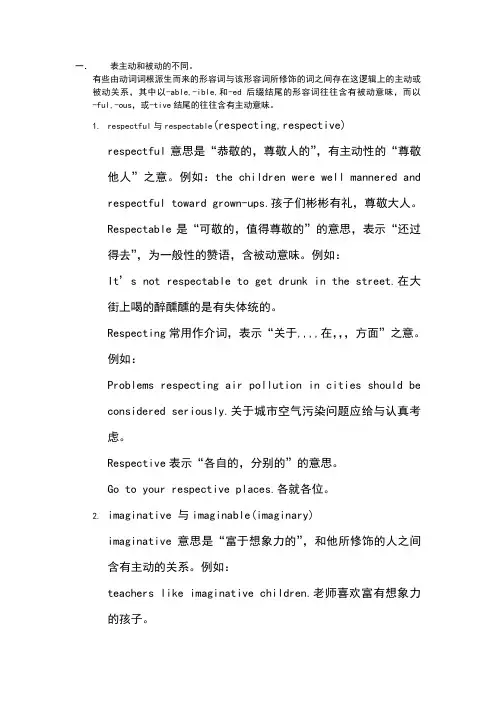
一.表主动和被动的不同。
有些由动词词根派生而来的形容词与该形容词所修饰的词之间存在这逻辑上的主动或被动关系,其中以-able,-ible,和-ed后缀结尾的形容词往往含有被动意味,而以-ful,-ous,或-tive结尾的往往含有主动意味。
1.respectful与respectable(respecting,respective)respectful意思是“恭敬的,尊敬人的”,有主动性的“尊敬他人”之意。
例如:the children were well mannered and respectful toward grown-ups.孩子们彬彬有礼,尊敬大人。
Respectable是“可敬的,值得尊敬的”的意思,表示“还过得去”,为一般性的赞语,含被动意味。
例如:It’s not respectable to get drunk in the street.在大街上喝的醉醺醺的是有失体统的。
Respecting常用作介词,表示“关于,,,,在,,,方面”之意。
例如:Problems respecting air pollution in cities should be considered seriously.关于城市空气污染问题应给与认真考虑。
Respective表示“各自的,分别的”的意思。
Go to your respective places.各就各位。
2.imaginative 与imaginable(imaginary)imaginative 意思是“富于想象力的”,和他所修饰的人之间含有主动的关系。
例如:teachers like imaginative children.老师喜欢富有想象力的孩子。
Imaginable意思是“可想象的”,还有可以被想象出来的意思,即被动意味。
例如:This is the only solution imaginable.这是唯一可想象的解决办法。
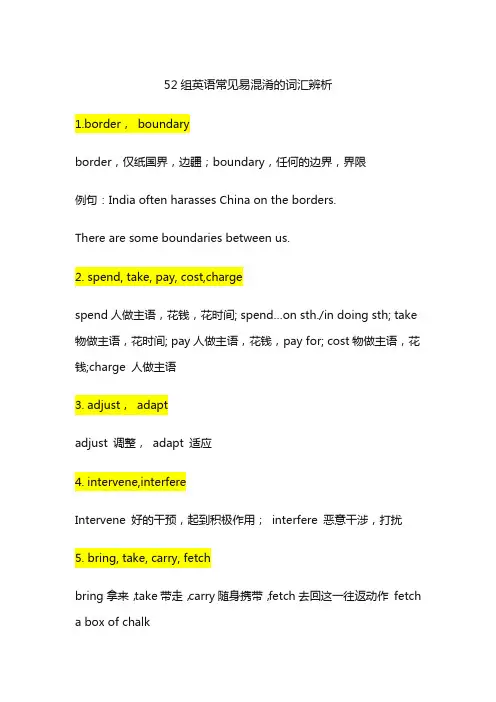
52组英语常见易混淆的词汇辨析1.border,boundaryborder,仅纸国界,边疆;boundary,任何的边界,界限例句:India often harasses China on the borders.There are some boundaries between us.2. spend, take, pay, cost,chargespend人做主语,花钱,花时间; spend…on sth./in doing sth; take 物做主语,花时间; pay人做主语,花钱,pay for; cost物做主语,花钱;charge 人做主语3.adjust,adaptadjust 调整,adapt 适应4.intervene,interfereIntervene 好的干预,起到积极作用;interfere 恶意干涉,打扰5. bring, take, carry, fetchbring拿来,take带走,carry随身携带,fetch去回这一往返动作fetch a box of chalk例句:Policemen are allowed to carry guns.6. sleeping, asleep, sleepysleeping正在睡觉,asleep睡着,熟睡,只能做表语,sleepy困的,有睡意的a sleeping baby The baby is asleep. I'm sleepy.7. used to, be used toused to过去常常,be used to习惯于,后接sth./doing sth.;被用来,后接do sth. He is used to getting up early.8. live on, live bylive on以…为主食,live by靠…谋生live on fish/ live by fishing9. leave, leave forleave离开,leave for前往He left Beijing for Shanghai.10. win, lose, beatwin后接sth.,反义词为lose, beat后接sb. win the game, beat them11. join, join in, take part injoin加入并成为其中的一员;join in参加小型的活动, join sb. in;take part in 参加大型的活动He joined the army five years ago.12. arrive, get, reacharrive不及物动词,后接in (大地点),at(小地点),get不及物动词后接to,reach及物动词arrive in Beijing, get to Beijing, reach Beijing13. lose, misslose失去(具体的物体),错过sth. is lost, lose the chance;miss 想念,错过sth. is missing, miss the chance14. be tired of, be tired with/frombe tired of厌烦…,be tired with/from因为…而累了be tired with/from running 800 meters15. feed, raisefeed喂养,养活,饲养(to give food to),raise饲养,养育(cause to grow, bring up children) raise the family16. care about, care forcare about关心,计较,在乎,一般多用于否定句中;care for关心,照料,喜欢,愿意例句:He doesn't care about his clothes.I don't care for movies.17. mean to do, mean doingmean to do打算,想要做某事,mean doing意思是,意味着By this I mean giving the students more practice.18. a girl, one girla girl可泛指所有女孩, one girl一个女孩Can one girl carry such a big box?19. in place of, in the place ofin place of代替,in the place of在…地方例句:A new building is built in the place of the old one.20. in secret, in the secretin secret秘密地,暗自地,偷偷地,一般用作状语;in the secret知道内情,知道秘密,一般用作表语My mother was in the secret from the beginning.21. take a chair, take the chairtake a chair相当于sit down坐下,take the chair开始开会21. die from, die ofdie from表示死于(枪)伤,虚弱,过度劳累,饮食过度等,die of 表示死于疾病,饥饿,寒冷,年老,忧愁,失恋等精神因素die of hunger and cold22. pay for, pay back, pay offpay for为…付钱,pay back还钱,但不一定还清,pay off还清pay for the book, pay off the debt23. manage, trymanage to do设法做成了某事,try to do尽力去做某事但不一定成功He tried to pass the exam, but he failed.24. be familiar to, be familiar withbe familiar to某物对某人来说是熟悉的,be familiar with某人熟悉某物The book is familiar to me. I'm familiar with the book.25. agree with, agree to, agree onagree with sb同意某人,agree to sth同意某事,agree on在…上达成一致意见,主语是复数agree with you, agree to the plan26. receive, acceptreceive收到某一东西,但不一定接受,accept接受I received a gift, but I didn't accept it.27. wear, put on, dresswear和dress表状态,wear接衣服等,可用进行时,dress接人,be dressed in, put on表动作It's cold outside. Put on your warm clothes.28. listen, hearlisten强调动作,hear强调结果I listened, but I heard nothing.29. look, see, watchlook看的动作,see看的结果,watch强调所看物体的变化、移动和发展watch TV30. lie, laylie躺,位于(lay, lain),说谎(lied, lied),lay平放(laid, laid) lay the book31. hurt, injure, woundhurt感情上受伤,injure事故中受伤,wound战争中受伤He was wounded in the war.32. turn, get, growturn表突变,后常接表颜色的词,get强调变的结果,grow强调过程,逐渐的变化turn yellow, get tired, grow big33. happen, take placehappen偶然性的没有预料到的事情的发生,take place必然性的发生Great changes have taken place in my hometown.34. at, in (表地点)at小地点,in大地点arrive at a small village, arrive in Shanghai 35. increase to, increase byincrease to增长到…,increase by增长了…The number increased by 2,000 to 5,000.36. besides, except, except forbesides除了…还(包括在内)except除了(不包括在内),except for 整体…除了某一点以外The composition is good except for a few spelling mistakes.37. on earth, on the earth, in the earthon earth在世上,在人间,到底,究竟,一点也不,on the earth在地上,在地球上,in the earth在地下,在泥土里no use on earth38. in surprise, to one's surprisein surprise惊奇地,to one's surprise使某人吃惊的是,39. in the air, on the air, in the skyin the air正在酝酿中,on the air播送,广播,in the sky在天空中His show is on the air at 6:00 tonight.40. since, for (完成时间状语)since接点时间或一句话,for接一段时间for three years, since 3:00 41. through, acrossthrough穿越空间,across在…上穿过through the forest, across the desert42. on the way, in the wayon the way在前往…的路上,in the way挡路The chair is in the way.43. above, on, overabove在上面,不接触,on在上面,接触,over在正上方fly over the hill44. until, not…untiluntil到…为止,not…until直到…才(常跟点动词连用)I waited until 3:00. He didn't come until 3:00.45. whether, if当是否解时,只有在宾语从句中二者可以互换,其余都用whether,当如果解时用if I don't know if/whether he will come. If he comes, I'll let you know.46. because, since, as, for原因由强到弱为:because, since/as, for. 在句中的位置如下:1)…because…2) Since/as…, …3) …, for…Since I was ill, I didn't go.47. when, as, while (表时间)when从句动词点动词,持续性动词均可,as重在表示动作同时发生,伴随进行,while从句动词为持续性动词While I slept, a thief broke in.48. the same…as, the same…thatthe same…as和…一样的(相似但不同一),the same…that 同一物体This is the same pen that I used yesterday. (同一支笔)49. as well, as well asas well也,常放于句末,和and连用表示既…又;as well as并列连词,不但…而且…He is a professor, and a writer as well.50. such…as, such…thatsuch…as像…样的,such…that如此…以至于He is not such a fool as he looks like. He is such a good student that all the teachers like him.51. because, because ofbecause连词,连接两句话,because of介词短语,后接词或短语He didn't go to school because of his illness.52. in order that, in order to表目的,in order that后接句子,in order to后接动词原形I got up early in order to catch the first bus. I got up early so that I could catch the first bus.。
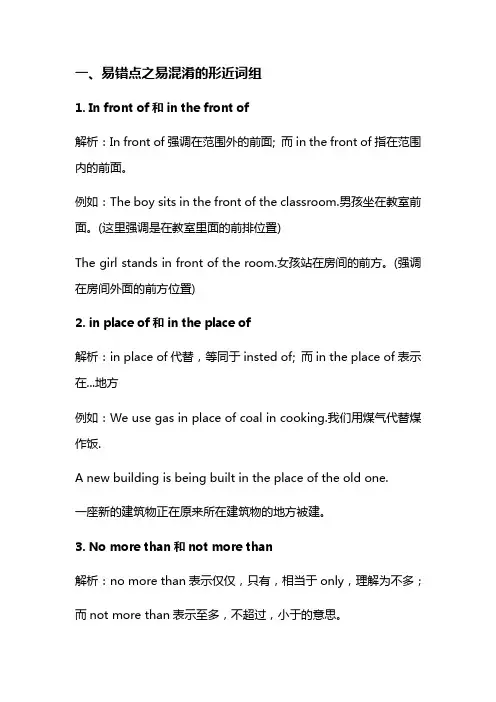
一、易错点之易混淆的形近词组1.In front of和in the front of解析:In front of强调在范围外的前面; 而in the front of指在范围内的前面。
例如:The boy sits in the front of the classroom.男孩坐在教室前面。
(这里强调是在教室里面的前排位置)The girl stands in front of the room.女孩站在房间的前方。
(强调在房间外面的前方位置)2.in place of和in the place of解析:in place of代替,等同于insted of; 而in the place of表示在...地方例如:We use gas in place of coal in cooking.我们用煤气代替煤作饭.A new building is being built in the place of the old one.一座新的建筑物正在原来所在建筑物的地方被建。
3.No more than和not more than解析:no more than表示仅仅,只有,相当于only,理解为不多;而not more than表示至多,不超过,小于的意思。
例如:He is no more than an ordinary English teacher. 他只不过是个普通的英文老师。
He has not more than three children. 他最多3 个孩子(有或许还不到三个)4.On earth和on the earth解析:两者都有在地上,在地球上的意思,但on earth还有到底,究竟的意思;On the earth只是单纯的表示在地上,在地球上例如:where on earth did you spring from?你究竟从哪里冒出来的?What if there was no lead on the earth at all?如果地球上根本就没有铅这种物质怎么办?5.At all和after all解析:at all表示根本,全然的意思,常用短语not at all表示一点也不;after all表示到底,毕竟的意思例如:I don't know him at all. 我根本不认识他。

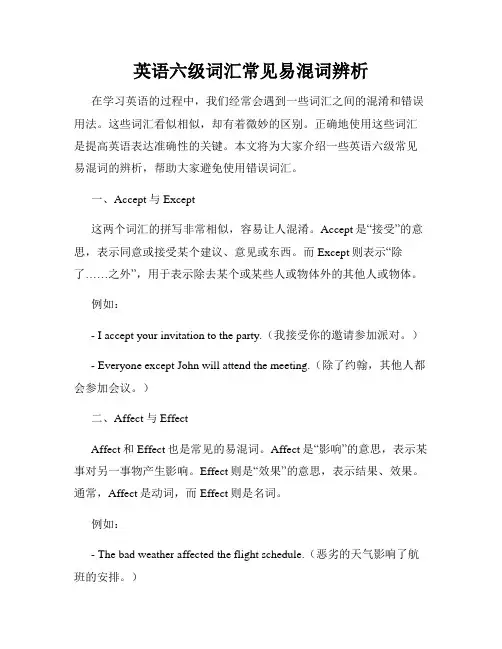
英语六级词汇常见易混词辨析在学习英语的过程中,我们经常会遇到一些词汇之间的混淆和错误用法。
这些词汇看似相似,却有着微妙的区别。
正确地使用这些词汇是提高英语表达准确性的关键。
本文将为大家介绍一些英语六级常见易混词的辨析,帮助大家避免使用错误词汇。
一、Accept与Except这两个词汇的拼写非常相似,容易让人混淆。
Accept是“接受”的意思,表示同意或接受某个建议、意见或东西。
而Except则表示“除了……之外”,用于表示除去某个或某些人或物体外的其他人或物体。
例如:- I accept your invitation to the party.(我接受你的邀请参加派对。
)- Everyone except John will attend the meeting.(除了约翰,其他人都会参加会议。
)二、Affect与EffectAffect和Effect也是常见的易混词。
Affect是“影响”的意思,表示某事对另一事物产生影响。
Effect则是“效果”的意思,表示结果、效果。
通常,Affect是动词,而Effect则是名词。
例如:- The bad weather affected the flight schedule.(恶劣的天气影响了航班的安排。
)- The new policy had a positive effect on the economy.(新政策对经济产生了积极影响。
)三、Principal与PrinciplePrincipal和Principle的区别在于前者是名词,指的是“校长”或“主要的人”,后者则是名词,意为“原则”或“准则”。
例如:- The principal of the school greeted the students at the gate.(学校的校长在大门口迎接学生们。
)- Honesty is an important principle to live by.(诚实是一种重要的生活准则。
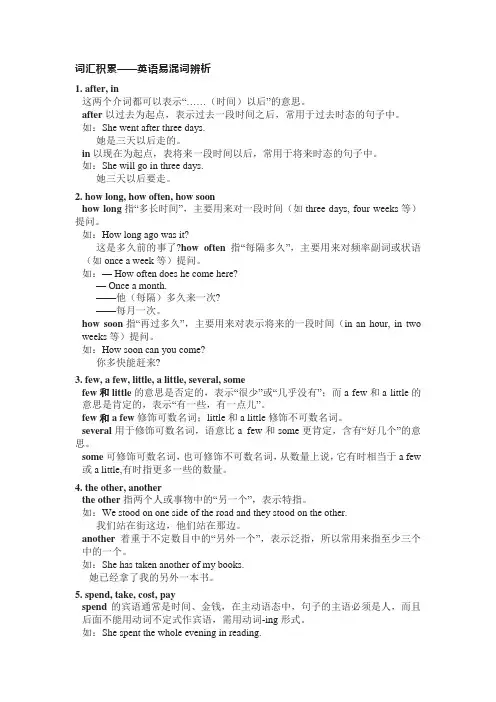
词汇积累——英语易混词辨析1. after, in这两个介词都可以表示“……(时间)以后”的意思。
after以过去为起点,表示过去一段时间之后,常用于过去时态的句子中。
如:She went after three days.她是三天以后走的。
in以现在为起点,表将来一段时间以后,常用于将来时态的句子中。
如:She will go in three days.她三天以后要走。
2. how long, how often, how soonhow long指“多长时间”,主要用来对一段时间(如three days, four weeks等)提问。
如:How long ago was it?这是多久前的事了?how often指“每隔多久”,主要用来对频率副词或状语(如once a week等)提问。
如:— How often does he come here?— Once a month.——他(每隔)多久来一次?——每月一次。
how soon指“再过多久”,主要用来对表示将来的一段时间(in an hour, in two weeks等)提问。
如:How soon can you come?你多快能赶来?3. few, a few, little, a little, several, somefew和little的意思是否定的,表示“很少”或“几乎没有”;而a few和a little的意思是肯定的,表示“有一些,有一点儿”。
few和a few修饰可数名词;little和a little修饰不可数名词。
several用于修饰可数名词,语意比a few和some更肯定,含有“好几个”的意思。
some可修饰可数名词,也可修饰不可数名词,从数量上说,它有时相当于a few 或a little,有时指更多一些的数量。
4. the other, anotherthe other指两个人或事物中的“另一个”,表示特指。
初中英语常见易混词汇辨析在初中英语的学习中,同学们常常会遇到一些容易混淆的词汇,这些词汇在拼写、发音、词义或用法上有相似之处,给我们的理解和运用带来了一定的困难。
下面就为大家详细辨析一些常见的易混词汇。
一、“a”和“an”“a”和“an”都属于不定冠词,用于泛指一个人或事物。
“a”用于以辅音音素开头的单词前,“an”用于以元音音素开头的单词前。
需要注意的是,这里所说的“元音音素”和“辅音音素”指的是读音,而不是字母。
例如,“a book”(一本书),“an apple”(一个苹果)。
“hour”(小时)这个单词虽然以“h”开头,但“h”不发音,它的读音是以元音音素开头,所以应该说“an hour”。
二、“alone”和“lonely”“alone”表示“独自的,单独的”,侧重于指客观上的独自一人,没有同伴。
“lonely”则表示“孤独的,寂寞的”,侧重于指主观上感到孤独、寂寞,带有感情色彩。
例如,“He lives alone but he doesn't feel lonely”(他独自生活,但并不感到孤独。
)三、“bring”和“take”“bring”意为“带来,拿来”,指把某物从别处带到说话者所在的地方。
“take”意为“拿走,带走”,指把某物从说话者所在的地方带到别处。
例如,“Bring your book here”(把你的书带到这儿来。
)“Take this bag to your room”(把这个包拿到你的房间去。
)四、“in front of”和“in the front of”“in front of”表示“在……前面”,指在某个物体外部的前面。
“in the front of”也表示“在……前面”,但指在某个物体内部的前面。
例如,“There is a tree in front of the house”(房子前面有一棵树。
)“The driver is sitting in the front of the bus”(司机坐在公共汽车的前部。
外教一对一英语词汇辨析一.technological, technical这是一组形近易混词。
1. technological [ˌtɛknəˈlɑdʒɪkəl]a.技术上的a major technological breakthrough主要技术性突破I think Israel tends to be at the leading edge of technological development. 我认为以色列在技术发展领域往往处于最前沿。
2.technical [ˈtɛknɪkəl]a.技术的,工艺(学)的;专门的,深奥的。
He's just written a book: large format, nicely illustrated and not too technical. 他刚出了本书:大开本,插图精美,专业性也不太强。
二.transaction, transition, transmission, transformation, transfer1.Transaction [trænˈsækʃən, -ˈzæk-]n.交易行为,处理 A transaction is a piece of business, for example an act of buying or selling something.Synonym: dealingThey have made huge profit out of the transaction.他们从这笔交易中获得了巨额利润。
2.Transition [trænˈzɪʃən, -ˈsɪʃ-]n. (从一种情况到另一种的)过渡,更替 Transition is the process in which something changes from one state to another.Synonym: conversion; change overInevitably the transition will yield some sticky moments过渡时期难免会出现一些困难的时候。
常见易混易错词汇辨析1. incident, accidentincident指小事件, accident指不幸的事故He was killed in the accident.2. sound, voice, noisesound自然界各种各样的声音,voice人的嗓音,noise噪音I hate the loud noise outside.3. population, peoplepopulation人口,人数,people具体的人China has a large population.4. weather, climateweather一天内具体的天气状况,climate长期的气候状况The climate here is not good for you.5. road, street, path, wayroad具体的公路,马路,street街道,path小路,小径,way道路,途径take this road;in the street,show me the way to the museum.6. custom, habitcustom传统风俗,习俗,也可指生活习惯,后接to do,habit生活习惯,习惯成自然,后接of doing. I've got the habit of drinking a lot.7. cause, reasoncause 指造成某一事实或现象的直接原因,后接of sth./doing sth,reason用来解释某种现象或结果的理由,后接for sth./doing sth. the reason for being late8. exercise, exercises, practiceexercise运动,锻炼(不可数),exercises练习(可数),practice(反复做的)练习Practice makes perfect.9. speech, talk, lecturespeech指在公共场所所做的经过准备的较正式的演说,talk日常生活中的一般的谈话,讲话,lecture学术性的演讲,讲课a series of lecture on…10. officer, officialofficer部队的军官,official政府官员an army officer11. work, job二者均指工作。
Unit1 易混淆词汇及短语辨析1、anyone,any oneanyone 只能指人,后面不接 of 短语。
any one 既可指人,也可指物,表示“(某些人或物中的) 任何一个”,后面可接 of 短语。
例: Anyone in our town knows him. 坑我们镇上任何一个人都认识他。
You can read any one of the books here. 你可以读这里的任何一本书。
2、something,anything,nothingsomething 复合不定代词,意为“某事;某物”,常用于肯定句中。
其用于疑问句中时,表示希望得到对方的肯定回答。
例: I know something about her. 我知道一点儿关于她的事。
anything 复合不定代词,一般用于疑问句或否定句中,其不同如下:疑问句中指“某事物”。
否定句中指“任何事物都(没有) ”。
肯定句中指“任何事物;无论任何事”。
nothing 复合不定代词,意为“没有什么;没有一件东西”,其作主语时,谓语动词用单数形式。
例: There is nothing new in today’s newspaper. 今天的报纸上没有什么新鲜事。
3、everyone,every oneeveryone 复合不定代词,意为“每人;人人;所有人”,相当于everybody,作主语时,谓语动词用单数形式。
every one 是两个词,既可指人,也可指物,后面可跟介词 of。
例:Everyone in our class likes Mr. Liu. 我们班的每个人都喜欢刘老师。
Everyone is here, and every one of us has a chance to speak at the meeting. 大家都到了,我们每个人都有机会在会上发言。
4、problem, questionproblem 指需要研究、解决的问题或难题,常与动词 solve 连用。
(1)Everyone was silent as he announced the winner of the competition.当他宣布竞赛的优胜者时,大家都静静地倾听。
(2)Experience is a revelation in the light of which we renounce our error of youth for those of aged.经验是一项启示,我们按照它来舍去年轻时(所犯的)错误而代之以年老时的错误。
(3)I don't know how to pronounce this word.我不知道这个单词怎么发音。
(4)The minister's action was denounced in the newspaper.部长的行为受到报界的指责。
3. acclaim claim exclaim reclaim proclaim declaim这几个词都是由claim这个词根衍生而来,意思也有关联之处。
acclaim v.欢呼,喝彩n.喝彩claim v. 要求,声称,主张n. 权利,主张,断言exclaim v.呼喊,惊叫reclaim vt.收回,开垦proclaim vt.宣布,声明declaim v.巧辩,(激昂地)演说(注:词干claim和clam有“喊叫,说”的意思)用法示例:(1)Her performance won her much critical acclaim.她的表演大获评论界赞颂。
(2)By comparison, an earthquake of similar intensity that shook America in 1988 claimed 25,000 victims.在88年美国发生的强度相当的一次地震却夺走了25000个人的生命。
(3)She exclaimed at the beautiful view.她对这美丽的景色感到惊奇。
1.blunder, error, mistake这一组词都表示“错误”。
blunder n. (因为无知、疏忽犯下的)大错,愚蠢的错误。
I think that I committed a blunder in asking her because she seemed very upset by my question.这位女士由于我的问题感到很难过,我感觉到犯了一个大错。
But he made an awful blunder.但他犯了一个糟糕的大错误。
And in Brazil there is always the possibility of a scandal or blunder.而且,巴西一直存在发生丑闻或捅出大漏子的可能性。
Sadly, we are still living with the consequences of that moral and strategic blunder.可悲的是,我们仍然要容忍那些道德和战略大错的后果。
error n.指判断、计算或行为上的错误,也可指智力或道义上的错误。
The accident was the result of human error.这事故是人为的错误造成的。
How can she explain away her error?她是怎样把错误解释过去的?The accident was caused by human error.这一事故是人为错误造成的。
The lawyer parted error from crime for him in court.在法庭上律师把他的错误与罪行区分开来。
mistake n.误会,误解;(粗心、遗忘所导致的)错误。
I took your bag instead of mine by mistake.我错拿了你的手提包。
She blasted to make him admit his mistake.她激烈批评使他承认自己的错误。
He compounded his mistake by arguing with the teacher.他与老师争吵就更加重了他的错误。
One should not plead inexperience in excuse of his mistake.一个人不应该借口缺乏经验来为其错误辩解。
2.blame, condemn, reproach, scold这一组动词都有“责怪”的意思。
blame v.责怪,把……归咎于。
You can't blame anyone in case you fail the exam.万一你考试不及格,你不能怪罪任何人。
condemn v.谴责,用于比较正式的、严肃的场合。
The wife condemned her husband for drinking too much.妻子因丈夫贪杯而责怪他。
reproach v. (书面语)责备,表示不满。
His teacher reproached him for not doing his homework.老师责备他不做作业。
Do not reproach yourself, it was not your fault.不要责备你自己,这不是你的过错。
I have nothing either to hope or fear, and nothing to reproach him with.我既没有什么奢望,也没有什么担心,更没有什么要责备他的地方。
Let us go forth therefore unto him without the camp, bearing his reproach. 这样,我们也当出到营外就了他去,忍受他所受的凌辱。
scold v.责骂,训斥。
Don't scold him; it is not his fault.不要骂他,这不是他的错。
He's too angry to hold on to himself not to scold.他太生气了,甚至控制不住自己大骂了起来。
Don't take any notice of the boy. If you scold him, he'll only start acting up. 不要理那孩子,你要是责骂他,他反倒会开始调皮捣蛋。
3.bewilder, puzzle, confuse, embarrass, perplex这一组词都有“迷惑”的意思。
bewilder v.使困惑,使茫然,强调非常困惑,通常表现为心理和智力的紊乱,语气最重。
He was fired without warning and is completely bewildered about the reason. 他没有得到事先警告就被开除了,完全不明白是什么原因。
When the farmers visited the city for the first time, they were bewildered by its complicated traffic system.当这些农夫们第一次到城里的时候,他们对城市复杂的交通系统感到迷惑不解。
puzzle v.使迷惑,感到不解,强调不理解或解决不了。
Where the sunken treasure is puzzles explorers.沉没宝藏的下落令探险家们大惑不解。
confuse v.一般用语,使混乱,使糊涂,强调因混淆而使人产生迷乱。
He sent the wrong reports because he confused them with other ones.他发错了报告,因为他把它们同另外一些报告混淆在一起了。
embarrass v.使窘迫,使为难,使困惑,有令人不快、难为情和内心混乱的意味。
Her boyfriend embarrassed her by teasing her about her new hairstyle in front of others.她的男友在别人面前嘲笑她的新发型,使她感到难堪。
perplex v.使杂乱,使疑虑,使不安。
The new tax laws perplex me.新税收法律使我很费解。
4.beam, chuckle, giggle, grin, jeer, laugh, roar, sneer这一组都有“笑”的意思,而它们之间的差别也是明显的。
beam v.本义指照耀,放光,引申为“微笑”,是正式用语,指面带喜悦或笑容,暗示对他人的友好或内心的满足。
She beamed with happiness.她高兴得眉开眼笑。
chuckle v. (书面语)吃吃的笑,抿嘴笑,轻声笑,多指因得意或领会到某事中的趣味而暗自发笑。
She does not laugh out loud; she only chuckles.她没有笑出声来,只是抿嘴而笑。
giggle v.咯咯地笑,痴笑,傻笑,多指女人和孩子由于紧张、被逗乐、尴尬时所发出的笑声。
The schoolgirls giggled when the famous football player walked into their classroom.当这个著名的足球运动员走进教室时,女生们都咯咯地笑起来。
grin v.露齿而笑,指人因高兴、满足、轻蔑等咧开嘴露齿地笑。
He grinned at his mother.他冲他的妈妈咧嘴一笑。
jeer v.讥笑,嘲笑,其同义词是mock。
The crowd jeered when the boxer was knocked down.当那个拳手被人打倒时,人群开始嘲笑他。
laugh v.笑,大笑,用于一般的笑或出声的大笑。
roar v.怒吼,咆哮,引申为放声大笑,哄堂大笑。
He roared when he heard the joke.听完这个笑话,他哈哈大笑。
sneer v.冷笑,嘲笑,指以语言、表情、和声调表示轻蔑或嘲弄。
He sneered at the offer and said it was two low.他对报价嗤之以鼻,说它太低了。
5.basic, elementary, fundamental的用法basic a.基本的,基础的,既可用于具体事物,也可用于抽象事物。
He has a basic understanding of the problem.他对问题有基本的了解。
element ary a.初步的,初级的。
elementary school小学With a funny rate that contains all the elementary rate constants as part of it.一个有趣的速率包含所有基本的速率常数,作为它的一部分。
My little sister, Becky, was born that year, and I started Year One at Winston Elementary, near the military base.我的妹妹,贝琪,在那年出生了,而我则开始在离军方基地不远的温斯顿小学上一年级。
All this is so elementary that one would blush to state it if it were not being constantly forgotten by those who coin and circulate the new slogans.所有这些实在是太基本了,如果不是因为那些杜撰和传播新口号的人一再忘记这些的话,在这里都不好意思再提。
fundamental a.根本性的,一般只用于抽象的事物;必要的,必须的。
Honesty is a fundamental principle in dealing with others.诚实是与别人相处的基本原则。
We should direct our attention at the fundamental question.我们应把注意力集中在这个基本问题。
This decision represents the fundamental interests of the people.这个决定反映了广大人民的根本利益。
Independence and sovereign equality among states is a fundamental principle of international law.国家的独立和主权平等,是国际法上的一项根本原则。